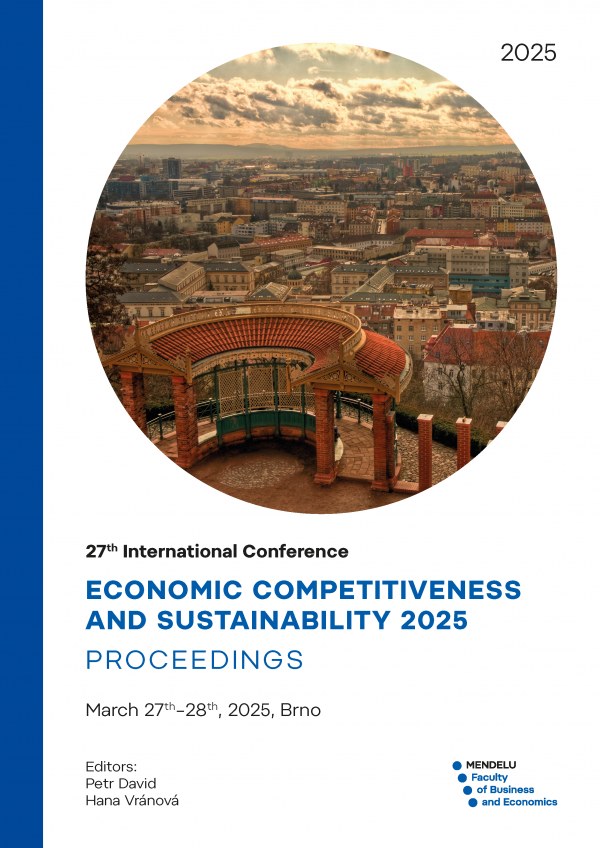
DOI: 10.11118/978-80-7701-047-4-0136
SUSTAINABLE COMPETITIVENESS: THE ROLE OF ENVIRONMENTAL PERFORMANCE IN ECONOMIC RANKINGS
- Elisabeth T. Pereira1,2
- 1 Reserch Unit in Governance, Competitiveness and Public Policies (GOVCOPP), University of Aveiro
- 2 Department of Economics, Management, Industrial Engineering and Tourism, University of Aveiro, Campus Universitario de Santiago, 3810–193 Aveiro, Portugal
This study examines the relationship between competitiveness and sustainability, demonstrating a positive correlation between high national competitiveness and strong environmental performance. Using data from the Environmental Performance Index (EPI) and the IMD World Competitiveness Ranking, the analysis highlights those sustainable practices that contribute significantly to long-term competitive advantage. The results show that countries excelling in economic infrastructure, innovation, and governance often prioritize environmental policies, enhancing both competitiveness and sustainability. These findings underscore the importance of integrating sustainable practices into economic strategies to foster balanced and resilient growth.
Klíčová slova: Competitiveness, Sustainability, 21st Century, Environmental Performance Index (EPI), IMD World Competitiveness Ranking, Resource-Based View (RBV), Economic Growth
stránky: 136-144, online: 2025
Reference
- ATICI, K. B., SIMÕES, P., and DIAS, M. F. 2021. The relationship between environmental performance and competitiveness: Evidence from European countries. Environmental Science & Policy. 120, 29-41. https://doi.org/10.1016/j.envsci.2021.02.009
 Přejít k původnímu zdroji...
Přejít k původnímu zdroji... - BANSAL, P., DESJARDINE, M. R. 2014. Business sustainability: It is about time. Strategic Organization. 12(1), 70-78.
 Přejít k původnímu zdroji...
Přejít k původnímu zdroji... - BARNEY, J. 1991. Firm resources and sustained competitive advantage. Journal of Management. 17(1), 99-120. https://doi.org/10.1177/014920639101700108
 Přejít k původnímu zdroji...
Přejít k původnímu zdroji... - BRESSER, R. K. F., POWALLA, M. 2012. Practical implications of resource-based theory in strategic decision-making: Assessing the VRIO framework against alternative heuristics. Zeitschrift für Betriebswirtschaft. 82, 335-359. https://doi.org/10.1007/s11573-012-0553-4
 Přejít k původnímu zdroji...
Přejít k původnímu zdroji... - DELMAS, M. A.,BURBANO, V. C. 2011. The drivers of greenwashing. California Management Review. 54(1), 64-87.
 Přejít k původnímu zdroji...
Přejít k původnímu zdroji... - DEVINNEY, T. M., SCHWALBACH, J., LEITNER, K.-H. 2022. Renewing the resource-based view: A special issue on contemporary contexts such as artificial intelligence and digitization. Wharton Faculty Papers. https://faculty.wharton.upenn.edu
- DIMA, A. M., GRABARA, J., VLĂDUŢESCU, S. 2018. Sustainable competitiveness: How does global competitiveness index relate to economic performance? Journal of Competitiveness. 10(4), 5-20. https://doi.org/10.7441/joc.2018.04.01
 Přejít k původnímu zdroji...
Přejít k původnímu zdroji... - ELKINGTON, J. 1997. Cannibals with forks: The triple bottom line of 21st century business. Capstone.
- ESTY, D. C., CHARNOVITZ, S. 2012. Environmental sustainability and competitiveness: Policy imperative and corporate opportunity. Harvard Business School Working Paper. https://www.hbs.edu/competitiveness/Documents/USComp-EstyCharnovitz-WorkingPaper.pdf
- ENVIRONMENTAL PERFORMANCE INDEX. 2022. 2022 EPI Results. Yale Center for Environmental Law & Policy. https://epi.yale.edu/epi-results/2022/component/epi
- FREEMAN, R. E. 1984. Strategic management: A stakeholder approach. Pitman.
- FRIEDE, G., BUSCH, T., BASSEN, A. 2015. ESG and financial performance: Aggregated evidence from more than 2000 empirical studies. Journal of Sustainable Finance & Investment. 5(4), 210-233.
 Přejít k původnímu zdroji...
Přejít k původnímu zdroji... - GHISELLINI, P., CIALANI, C., ULGIATI, S. 2016. A review on circular economy: The expected transition to a balanced interplay of environmental and economic systems. Journal of Cleaner Production. 114, 11-32.
 Přejít k původnímu zdroji...
Přejít k původnímu zdroji... - HART, S. L. 1995. A natural-resource-based view of the firm. Academy of Management Review. 20(4), 986-1014.
 Přejít k původnímu zdroji...
Přejít k původnímu zdroji... - HART, S. L., MILSTEIN, M. B. 2003. Creating sustainable value. Academy of Management Perspectives. 17(2), 56-67.
 Přejít k původnímu zdroji...
Přejít k původnímu zdroji... - IMD World Competitiveness Center. 2024. IMD World Competitiveness Ranking 2024. https://www.imd.org/centers/world-competitiveness-center/rankings/world-competitiveness/
- KRAAIJENBRINK, J., SPENDER, J.-C., GROEN, A. J. 2010. The resource-based view: A review and assessment of its critiques. Munich Personal RePEc Archive. [Accessed: 28October 2024] https://mpra.ub.uni-muenchen.de/21442/
- LUO, X., BHATTACHARYA, C. B. 2006. Corporate social responsibility, customer satisfaction, and market value. Journal of Marketing. 70(4), 1-18.
 Přejít k původnímu zdroji...
Přejít k původnímu zdroji... - NIDUMOLU, R., PRAHALAD, C. K., RANGASWAMI, M. R. 2009. Why sustainability is now the key driver of innovation. Harvard Business Review. 87(9), 56-64.
- PENG, M. W. 2001. The Resource-Based View and International Business. Journal of Management. 27, 803-829. http://dx.doi.org/10.1177/014920630102700611
 Přejít k původnímu zdroji...
Přejít k původnímu zdroji... - PEREIRA, E. T. 2005. Factors of competitiveness and business performance: A study applied to the ceramics sector in Portugal. Doctoral dissertation. University of Aveiro.
- PORTER, M. E. 1990. The competitive advantage of nations. Free Press.
 Přejít k původnímu zdroji...
Přejít k původnímu zdroji... - PORTER, M. E., KRAMER, M. R. 2011. Creating shared value. Harvard Business Review. 89(1/2), 62-77.
- PORTER, M. E., VAN DER LINDE, C. 1995. Toward a new conception of the environment-competitiveness relationship. Journal of Economic Perspectives. 9(4), 97-118. https://doi.org/10.1257/jep.9.4.97
 Přejít k původnímu zdroji...
Přejít k původnímu zdroji... - SANTOS, S. F., SIQUEIRA, H. B. 2014. A canonical correlation analysis of the relationship between sustainability and competitiveness. Clean Technologies and Environmental Policy. 16(8), 1735-1746. https://doi.org/10.1007/s10098-014-0755-2
 Přejít k původnímu zdroji...
Přejít k původnímu zdroji... - SCHALTEGGER, S., WAGNER, M. 2011. Sustainable entrepreneurship and sustainability innovation: Categories and interactions. Business Strategy and the Environment. 20, 222-237. https://doi.org/10.1002/bse.682
 Přejít k původnímu zdroji...
Přejít k původnímu zdroji... - Teece, D. J., Pisano, G., Shuen, A. 1997. Dynamic capabilities and strategic management. Strategic Management Journal. 18(7), 509-533.
 Přejít k původnímu zdroji...
Přejít k původnímu zdroji... - WORLD COMMISSION ON ENVIRONMENT AND DEVELOPMENT (WCED, 1987). Our Common Future. Oxford University Press.
- WORLD ECONOMIC FORUM (2019). The Global Competitiveness Report 2019. [Accessed: 28October2024] https://www.weforum.org/reports/the-global-competitiveness-report-2019
- YALE CENTER FOR ENVIRONMENTAL LAW & POLICY, & CENTER FOR INTERNATIONAL EARTH SCIENCE INFORMATION NETWORK. 2024. Environmental Performance Index. [Accessed: 28October2024] https://epi.yale.edu/
- ZHANG, X., WANG, H., LI, X. 2021. The effects of environmental performance on competitiveness and economic growth: The moderating role of human development. Environment, Development and Sustainability. 23(10), 14523-14540. https://doi.org/10.1007/s10669-021-09828-w
 Přejít k původnímu zdroji...
Přejít k původnímu zdroji...


